Health, Home & Family
 (NAPSI)—A new approach to indoor ventilation has been developed that can significantly decrease the risk of COVID and influenza outbreaks in schools, offices and other indoor environments, and even speed a reduction in mask wear.
(NAPSI)—A new approach to indoor ventilation has been developed that can significantly decrease the risk of COVID and influenza outbreaks in schools, offices and other indoor environments, and even speed a reduction in mask wear.
The innovative invention captures and cleans individuals’ breaths within seconds, before potential viruses have a chance to be dispersed throughout a room, improving overall indoor air quality. Current methods, including upgrades to existing HVAC systems, have proven somewhat ineffective as COVID outbreaks continue to create disruptions in indoor settings throughout the United States.
“Existing ventilation systems in schools, offices and elsewhere were not built for virus control. Not only does better ventilation decrease the risk of catching COVID, it has been shown to also improve work productivity and school performance,” said Larry Schoen, P.E., Fellow ASHRAE, Principal Engineer for Schoen Engineering Inc. “And even after upgrading a traditional HVAC ventilation system with better filters, it still allows virus-laden air to affect others in a room, creating the potential for contagion.” Continue reading
 by the We Can Do This COVID-19 Public Education Campaign
by the We Can Do This COVID-19 Public Education Campaign
(NAPSI)—Questions and misinformation about the effect of COVID-19 vaccines on fertility and pregnancy have left some people uncertain about getting vaccinated if they are pregnant or hoping to get pregnant, but the facts should be reassuring.
“It’s understandable that parents and those who hope to become parents are cautious about COVID-19 vaccines,” said Dr. Steven Gordon, Chair of the Department of Infectious Disease at Cleveland Clinic. “However, it should be comforting to know that the vaccines are safe and effective during pregnancy. Growing data and science demonstrate that the benefits of getting vaccinated far outweigh any risks and we have a long history with vaccines that makes it clear they do not affect future fertility.” Continue reading
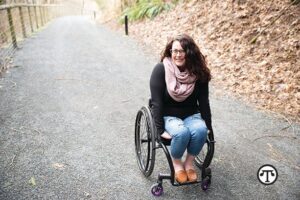 (NAPSI)—For decades, medical researchers struggled to solve the mystery of how to reverse paralysis caused by serious spinal cord injuries. Finally, hope appears to be at hand.
(NAPSI)—For decades, medical researchers struggled to solve the mystery of how to reverse paralysis caused by serious spinal cord injuries. Finally, hope appears to be at hand.
Making Mice Move
Remarkable video footage shows how paralyzed mice regained some of their ability to walk again after receiving an experimental drug treatment.
The injectable pre-clinical therapy, which is designed to regenerate nerve cells in spinal cord injuries, is being developed by researchers at Northwestern University in Evanston, Illinois.
However, the scientists have yet to make the big leap from animal to human clinical trials, meaning that this drug candidate is quite a few years from potentially being approved by government regulators for commercialization. Continue reading
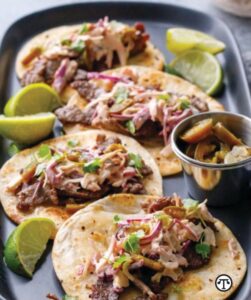 Heart disease is the leading cause of death for men, women, and people of most racial and ethnic groups in the United States—about 655,000 Americans die from heart disease each year, according to the Centers For Disease Control And Prevention—but you can protect yourself 3 ways.
Heart disease is the leading cause of death for men, women, and people of most racial and ethnic groups in the United States—about 655,000 Americans die from heart disease each year, according to the Centers For Disease Control And Prevention—but you can protect yourself 3 ways.
Three Steps To A Healthier Heart
- Don’t smoke. If you do smoke, quit. Your doctor can help.
- Get regular exercise. The Surgeon General recommends 2 hours and 30 minutes of moderate-intensity exercise week.
- Eat right. Choose plenty of fresh fruits and vegetables and foods high in fiber and low in saturated fats, trans fat, and cholesterol.
To help, Mazola® Corn Oil has come up with a number of recipes that are delicious and support heart health. The all-purpose cooking oil is a heart-healthy* choice for baking, grilling, sautéing, stir frying or mixing up a marinade.
Plus, it has a high smoke point of 450° F. All cooking oils have a smoke point that, once exceeded, negatively affects the food’s flavor.
Here’s a heart-healthy* recipe, popular with Latinx cooks, that’s delicious for everyone: Continue reading
COVID-19 Public Education Campaign
(NAPSI)—Entering the second holiday season of the COVID-19 pandemic, West Virginians are eager to reconnect with family and friends and return to treasured holiday traditions. Some simple steps can keep family and friends healthy through their fall and winter celebrations.
“Every family has unique traditions, and they are eager to enjoy time with loved ones this year, especially if they skipped or changed their holiday plans due to COVID-19 in 2020,” said Dr. Michael Edmond, Chief Medical Officer, WVU Medicine. “With a little care and planning, it is possible to enjoy these special holiday traditions while making sure everyone stays healthy.”
As generations gather to celebrate, the No. 1 way to avoid spreading COVID-19, including to grandparents, young children and others who may be vulnerable, is to make sure everyone who is eligible gets vaccinated against COVID-19. Children ages 5-11 are the most recent group eligible for a COVID-19 vaccine. Learn more at www.cdc.gov/coronavirus.
People can take these additional steps to ensure they safely enjoy family, friends and special connections they may have missed recently, even as people from different households and different parts of the country gather. Continue reading
 For renters seeking a new apartment community since the start of the COVID-19 pandemic, finding the best place to live has come down to the three Rs—ratings, reviews and reputation.
For renters seeking a new apartment community since the start of the COVID-19 pandemic, finding the best place to live has come down to the three Rs—ratings, reviews and reputation.
The search for a new place to rent can bring challenges and stresses, but pandemic concerns and restrictions on in-person tours can make that search more difficult. As a solution, renters are skipping the physical tours and going digital to vet communities. As such, online ratings and reviews have become critical for many renters seeking new spaces.
Expert Opinion
“More than 85% of all renters industrywide indicate they read reviews before making a decision on which apartment they want to live in. That’s significant,” said Mike Gomes, chief experience officer for Cortland, which owns and operates more than 200 apartment communities across the country. The company benefited greatly from positive reviews, attracting new residents throughout its portfolio despite the unimaginable challenges of 2020. Through a responsive customer care team and a tenant-focused service philosophy, it has maintained its position as the No. 1 property management brand in online reputation. Continue reading
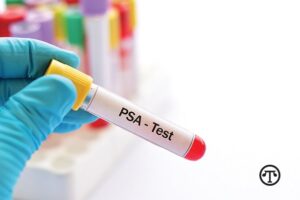 Children and teens are catching and spreading COVID-19 at an increasingly high rate. Even if your child or teen has not yet contracted COVID-19, they are at risk, especially with the low number of vaccinated residents in Oklahoma.
Children and teens are catching and spreading COVID-19 at an increasingly high rate. Even if your child or teen has not yet contracted COVID-19, they are at risk, especially with the low number of vaccinated residents in Oklahoma.
“In the early months of the COVID-19 pandemic, older people were most likely to get the virus. Now it is affecting everyone, and children and teens are also at risk of contracting the virus and experiencing long-lasting impacts,” said Dr. Dale Bratzler, University Chief COVID Officer and Professor in the OU Hudson College of Public Health. “We need to do everything we can to keep all our kids safe, and the best way to do that is to get more people vaccinated.”
Parents and other adults in a child or teen’s life can take steps to protect young people and themselves.
Get Your Child Vaccinated When Eligible
The best way to protect your children from COVID-19 and all the potential complications is to get them vaccinated as soon as they are eligible. The COVID-19 vaccine is free, widely available, and highly effective in preventing hospitalization and death from COVID-19. Like most vaccines, some minor side effects may occur, such as a sore arm or slight fatigue, but the symptoms and long-term impact of contracting COVID-19 are much more serious. Ultimately, it is much safer for children and teens to get a COVID-19 vaccine than getting the disease itself.
Practice Prevention
If your children are not eligible to be vaccinated, you can still keep them safe from COVID-19 by practicing recommended prevention methods such as physical distancing when possible and continuing to wear a mask, especially in crowds or while indoors. Even people who have been vaccinated should wear a mask in crowds and public indoor places. Most children can safely and effectively wear face masks, so it’s important to remind them that it keeps them safe and to set an example by wearing a mask, too.
Encourage Adults In Your Child’s Life To Get Vaccinated
Ensuring that those who spend time around your child are vaccinated helps keep an unvaccinated child from getting sick or spreading COVID-19 to other vulnerable people. Talk to the adults in your child’s life—grandparents, friends’ parents, and teachers—about getting vaccinated to protect themselves and your child.
Children and teens are just as susceptible to COVID-19 as adults, and they can spread the virus to others who are at even greater risk. A growing number of children and teens have been hospitalized with COVID-19. Getting all eligible children and teens vaccinated and following simple prevention measures will protect them, their families, and friends, and get everyone one step closer to getting this pandemic under control.
Learn More
For more information and to find a vaccine, visit www.vaccines.gov.
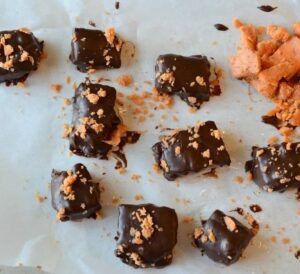 Homemade Butterfingers are the most addictive candy bars, maybe ever. These bite-sized chocolate bars are great for a Halloween bash, but they are also great for your everyday chocolate cravings!
Homemade Butterfingers are the most addictive candy bars, maybe ever. These bite-sized chocolate bars are great for a Halloween bash, but they are also great for your everyday chocolate cravings!
Ingredients
- 3 cups candy corn
- 1 1/2 cups creamy peanut butter
- 2 cups good quality chocolate – milk, dark, or even white!
Instructions
- Line a 9×9 inch baking dish with parchment paper (be sure to cover up the sides of the dish too), and set aside.
- In a large glass bowl melt the candy corn in the microwave. Melt it in 30 second spurts and stir it well in between each time. When it is completely melted add the peanut butter and stir to combine. Pour it into the prepared pan, spreading it out, and smoothing the top. Let the mixture cool completely, about an hour.
- When cool, remove the candy from the pan by pulling on the parchment paper. Place the parchment paper and candy on a cutting board. Using a sharp knife, cut the candy into bite-sized pieces.
- Melt the chocolate and then dip each piece of candy completely into the chocolate. Remove and place on a piece of waxed paper until the chocolate is set, about 20 minutes.
- Serve or store in an air-tight container.
(NAPSI)—There’s good news, bad news and better news about combating cancer in America these days.
The good news is there’s been an overall decline in U.S. cancer deaths since 1991.
The bad news is not all patients have benefited equally from advances in prevention, early detection and precision medicine. One study found that around 8.1 percent of cancer patients participate in a clinical trial. Of those, FDA data show that only 4 percent of clinical trial participants are Black and 5 percent are Hispanic.
What’s more, minority groups overall in the U.S. have both the highest death rate and shortest survival rate for most cancers. These inequities in cancer care have been ongoing for decades, due in part to socio-economic barriers, insufficient information about trials and their benefits, as well as other challenges.
The better news is a major funder of cancer research is working to tackle cancer disparities. Stand Up To Cancer® (SU2C), which raises money to accelerate the pace of research to get new therapies to patients quickly and save lives now, began formalizing its Health Equity Initiative in 2017. The initiative aims to increase minority representation in cancer clinical trials and ensure new cancer treatments are effective for all. Continue reading
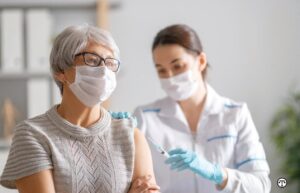 (NAPSI)—With the three new COVID-19 vaccines widely available, millions of Americans have been encouraged to get vaccinated. The Centers for Disease Control and Prevention (CDC) reports that, as of July 2021, 47% of the total U.S. population is now fully vaccinated and over 182 million Americans have received at least one dose. This effort has helped reduce the number of COVID-19 cases and deaths.
(NAPSI)—With the three new COVID-19 vaccines widely available, millions of Americans have been encouraged to get vaccinated. The Centers for Disease Control and Prevention (CDC) reports that, as of July 2021, 47% of the total U.S. population is now fully vaccinated and over 182 million Americans have received at least one dose. This effort has helped reduce the number of COVID-19 cases and deaths.
But people with diabetes may have questions about COVID-19 vaccines, including whether they should get vaccinated and whether the vaccines are safe. If you have diabetes, here is what you need to know:
•People with diabetes should get vaccinated. About 40% of people who died from COVID-19 from February to April 2020—before COVID-19 vaccines were publicly available—had diabetes. People with type 1 or type 2 diabetes often have complications including heart disease and obesity, which means people with either type of diabetes are at a much higher risk of developing severe illness if they were to get COVID-19. One of the best ways to avoid becoming seriously sick with COVID-19 is to get vaccinated.
•The three COVID-19 vaccines are safe for people with diabetes. The available vaccines are not made from SARS-COV-2, the coronavirus that causes COVID-19, so there is no risk of getting sick with COVID-19 just from getting the vaccine. People with diabetes were included in COVID-19 vaccine clinical trials across the United States and other countries, and none of the trials reported significant safety issues among study participants.
•Continue monitoring your blood glucose regularly after being vaccinated. In some individuals, the vaccine may cause possible side effects that can be similar to feeling sick, such as chills, fever, and nausea. People with diabetes should speak with their health care professional about this and how to monitor their blood glucose levels following COVID-19 vaccination. Continue reading


